This is part II of our coverage of Singularity Summit 2011, focusing on the topics of artificial intelligence and the brain.
After reading this article, don’t forget to read Part I Longevity And Health, and Part III Singularity And The Future. Also, you can see all three parts rolled into one story if you prefer.
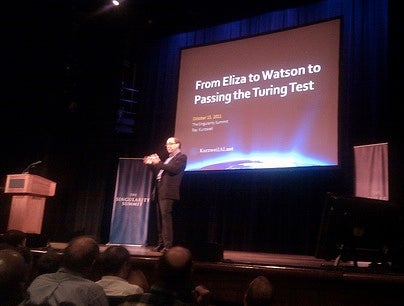
Ray Kurzweil – From Eliza to Watson to Passing the Turing Test
Ray Kurzweil was the opening speaker to kick off Singularity Summit 2011 and he talked about his latest book project on building an artificial mind. He dropped some tidbits of what to expect in the book, including his assertion that translating the human neocortex into lines of code should only be about 1 million lines. Sure, that’s quite a bit of code, but not an impossible task. He went further to say that in terms of RAM, this should translate into approximately 25 megabytes when accounting for the redundancy of connections in the human brain. Of course, this is a bold prediction, but that’s what Kurzweil is known for. And not surprisingly, not everyone agrees with the claims he makes. Kurzweil spent the better part of his talk addressing a recent piece in Technology Review by Microsoft co-founder Paul Allen entitled “The Singularity Isn’t Near”. The article is a direct rebuttal of Kurzweil’s predictions (and his book “The Singularity is Near”). Kurzweil’s main counterpoint to Allen’s article is that Allen spends his time disputing Kurzweil’s article (The Law of Accelerating Returns) from 2001, admitting that he hasn’t read the much more detailed and comprehensive book “The Singularity is Near” that Kurzweil published in 2005. While it seems that Kurzweil is open to criticisms of his ideas, he was clearly incredulous that someone would attempt to discredit them without having actually sifted through the details.

Christof Koch – Neurobiology and Mathematics of Consciousness
I’ll start here by admitting that much of what Dr. Christof Koch had to say was over my head. However, I understood how profound it was and it appeared that the rest of the audience did as well, as evidenced by the number of questions he received afterwards. Koch, a professor of cognitive and behavioral biology at Caltech, studies how a conscious experience arises from the connection of neurons in the brain. How does the movement of electrical impulses from one nerve cell to another result in the subjective experience of seeing a color or hearing music? He began his talk by detailing what we already know about consciousness. It is associated with complex biological networks and it disappears during deep sleep. However, consciousness does not require behavior, emotions, long-term memory, language, selective attention, or even self-consciousness. So Koch studies consciousness using a reductionist approach. He wants to understand what the minimum level of organization is that gives rise to consciousness. In that regard, Koch and his colleagues have worked out a mathematical equation that may allow the calculation of consciousness. This equation is based on the observation that consciousness is both highly integrated and results from a highly differentiated state. So what does this all mean? If this equation actually works, it may allow us to determine if and when a computer can reach consciousness. And this is a very important philosophical question as we continue marching towards the singularity. One that will impact how we interact with and integrate these machines into our lives.
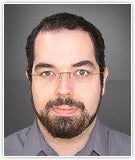
Eliezer Yudkowsky- Open Problems in Friendly Artificial Intelligence
Eliezer Yudkowsky, a research fellow at the Singularity Institute, gave a lively presentation about some issues that might be involved with creating an artificial intelligence (AI) that is fully capable of self-modification. He argues that just because we may eventually succeed in building this sort of AI (which he believes will happen) AND we are successful in making it a friendly AI (meaning it will not want to destroy our species), we simply can’t ensure that the subsequent AIs it produces will remain friendly. While it is a scary thought, Yudkowsky presented it more as a challenge to those who are working on developing this critical new technology. You can read more in-depth about Yudkowsky’s ideas in this online paper he authored.
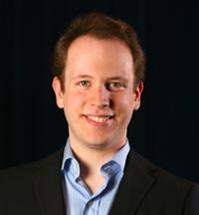
Alexander Wissner-Gross – Planetary-Scale Intelligence
Dr. Alexander Wissner-Gross, a research affiliate of the MIT Media Laboratory, presented on how we can predict where a AI with worldwide reach would come from. In his view, it would come from the finance and marketing industries. Wissner-Gross believes that since money is the great motivator and the finance and marketing industries are most concerned with predicting how to invest and how to sell to consumers, they have the greatest incentive to develop AI. Between these two industries however, Wissner-Gross believes that finance will reach this holy grail first, since that industry is flush with investment dollars and is currently very advanced technologically. And you don’t need to be a Wall Street financier to realize this. The speed at which financial information zooms around the planet, with high-speed computers running sophisticated software programs to analyze the markets and make instantaneous trades, is currently mind-boggling. So much so in fact, that regulatory bodies like the US Securities and Exchange Commission are playing catch-up to make sure that these investment firms are playing within the rules. Wissner-Gross says that the singularity will likely play out in a manner similar to what we’re seeing with the role of increasingly sophisticated programs in the finance world and we had better start paying attention.
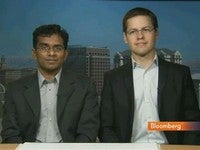
Scott Brown and Dileep George – From Planes to Brains: Building AI the Wright Way
Another presentation on artificial intelligence, this time from 2 guys with a new start-up taking a unique approach. Scott Brown and Dr. Dileep George, founders of Vicarious Systems, tag-teamed this presentation about the science, engineering, and business behind their company. Their approach is akin to what the Wright brothers did for flight in that although they took inspiration and insights from the way birds soared, they didn’t try to fly by using an airplane that had flapping wings. In the same manner, although AI development is based on a human brain, it doesn’t need to function in exactly the same manner. Instead Vicarious Systems seeks to exploit the underlying assumptions the brain uses to process information for building AI. George went on to explain how neuronal processes involved in keeping the cells alive, communicating with other neurons, and processing information are found in all levels of brain organization. However, the goal of AI development is to just tease out the information processing ability of neurons to replicate. The other abilities of the neurons are irrelevant. With a substantial amount of funding from some big names in Silicon Valley, it seems that the Vicarious approach to AI development is resonating with many people. Keep an eye on these guys!
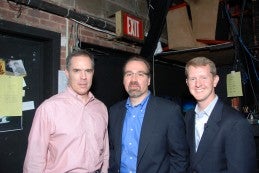
IBM’s Watson: Research, Commercialization, Application
I’ve lumped the last 3 talks of the summit into this section since they all dealt with IBM’s Watson supercomputer from different angles. First, David Ferrucci, lead developer of Watson, talked about what it was like to work on the project. He gave some specifics on Watson that were mind-boggling: 2,880 cores, 15 terabytes of RAM, and 80kW of power! To compete against human brains that run on a tuna fish sandwich and a glass of water. We might have the edge on energy efficiency so far, but it’s noly a matter of time. Ferrucci also talked about the separate development team that focused solely on Watson’s “pun detector” for Jeopardy! so that it would understand a clue about a holy city referring to St. Paul, MN and not just the Vatican.
Next, Dan Cerutti, general manager of IBM’s Watson commercialization group, talked about the next potential fields where we might see Watson working. After all, it wasn’t just built to play Jeopardy! The most likely applications are in the finance world (see Wissner-Gross’s presentation) and the healthcare field. While IBM isn’t looking to replace human doctors just yet, there is a place for Watson alongside clinicians, helping to track and diagnose patients, and helping to reduce costs and mistakes along the way. Other potential applications include the legal world, with the loads of text and notes that need to be analyzed as well as education and customer service.
The final talk of the summit was Ken Jennings, who talked about what it was like to play against Watson…and lose! This might have been the funniest of all presentations and Jennings really had a great stage presence. It was light-hearted and very informative as to the behind-the-scenes workings of Jeopardy! Jennings did, however, take the time to address some topics related to the singularity. He voiced some concern that our over-dependence on technology was making us dumber and cited some studies that had actually shown atrophy of the hippocampus in response to less use and conversely, it’s growth when stimulated, as in the taxi drivers of London, who are tasked with the daunting job of navigating the city’s busy streets. So a bit of a serious and cautionary tone but overall, a great presentation. And one that got plenty of positive responses from the audience!
After reading this article, don’t forget to read Part I Longevity And Health, and Part III Singularity And The Future. Also, you can see all three parts rolled into one story if you prefer.
[Sources: Singularity Summit, Wikipedia]
[Image credits: KurzeilAI.net, David Orban, Singularity Summit, Bloomberg]



